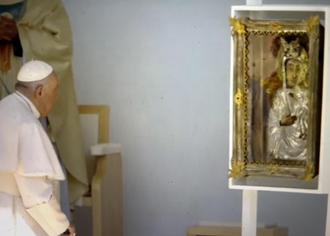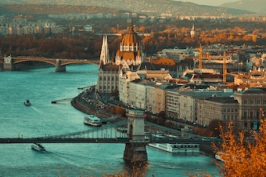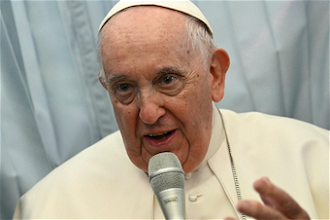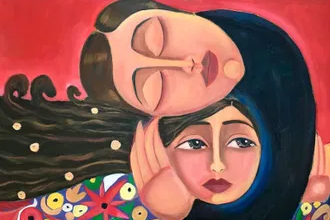Pope in Hungary - Day Three

Pope prays before icon of Our Lady after Mass and Regina Coeli in Kossuth Lajos Square
Source: Vatican News
Tens of thousands gathered in Kossuth Lajos Square, central Budapest for Holy Mass with Pope Francis on Sunday
The Holy Father based his homily on the Gospel reading of the day which focuses on the figure of the Good Shepherd. A good shepherd, he said, "gives his life for his sheep."
"Jesus, like a shepherd who goes in search of his flock, came to find us when we were lost," he said. "Like a shepherd, He came to snatch us from death...." Christ, the Good Shepherd, does two things in particular for His sheep, the Pope continued: He calls His sheep by name, and He leads them out.
Pope Francis reminded the faithful that God calls each of us by our name, desiring "to save us from sin and death, to give us life in abundance and joy without end.... Jesus came as the Good Shepherd of humanity, to call us and bring us home."
The Pope went on to explain that, as Christians, we are all "called by name by the Good Shepherd, summoned to receive and spread His love, to make His fold inclusive and never to exclude others."
From this, he said, it follows that we are called to build fraternity and avoid divisions, "opening our hearts to mutual love."
After the Shepherd calls His sheep, the Pope continued, He goes on "to lead them out," to send them forth into the world to be "witnesses of the love that has given us new birth."
Introducing the image of the door, Pope Francis said that Jesus is the door that brings us "into the fold of the Church" and then "leads us back into the world."
The Pope said it is sad that doors are so often closed to the lonely, the underprivileged, foreigners, migrants. Closed doors are found "even in our ecclesial communities," doors are closed "to other people… to the world… to those who are 'irregular'… those who long for God's forgiveness."
Pope Francis said: "Please, let us open those doors! Let us try to be, in our words, deeds, and daily activities, like Jesus, an open door, a door that is never shut in anyone's face, a door that enables everyone to enter and experience the beauty of God's love."
Addressing bishops and priests, and all those who are "shepherds" in the Church, the Pope called them to be "increasingly open doors, 'facilitators' of God's grace. He also called on the lay faithful, including catechists and pastoral workers, political and social leaders: "Be open doors! ... Be open and inclusive, then, and in this way, help Hungary to grow in fraternity, which is the path of peace."
The Holy Father concluded his homily by inviting the faithful to never be discouraged, and to remember that Jesus the Good Shepherd "calls us by name and cares for us with infinitely tender love."
At the conclusion of Mass before the Regina Coeli prayer, Pope Francis entrusted the people of Hungary to the Blessed Virgin Mary, under the title of Magna Domina Hungarorum.
"From this great city and from this noble country," he said, "I desire to entrust to her heart the faith and the future of the entire continent of Europe, which has been on my mind in these days and, in particular, the cause of peace."
Pope Francis prayed especially for "the neighbouring, beleaguered Ukrainian people and the Russian people, both consecrated to you."
"You, who are the Queen of Peace," he prayed, "instil in the hearts of peoples and their leaders the desire to build peace and to give the younger generations a future of hope, not war, a future full of cradles not tombs, a world of brothers and sisters, not walls and barricades."
The Pope also recalled how the Virgin Mary accompanied the first steps of the early Christian community, holding the disciples together with her prayer. He expressed his hopes that the Church in Europe might find in her "strength in prayer, renewed humility and obedience, and be an example of convincing witness and joyful proclamation."
Pope Francis went on to thank Hungary's government authorities and all Hungarians for their heartfelt welcome and "the affection I have experience in these days."
He especially thanked the many people who have travelled from afar to encounter him during his three-day Apostolic Journey.
"I think especially of the sick and the elderly, of those who were unable to be present with us, of those who are lonely and those who have lost faith in God and hope in life," he said. "I am close to all of you; I pray for you and I give you my blessing."
Acknowledging the many people of other Christian confessions who followed his Visit to Hungary, the Pope urged Christians to always support one another, since we are all "united by the Gospel".
He noted the words of Cardinal Peter Erdo, Archbishop of Esztergom-Budapest, who pointed out that Hungary has lived "on the eastern border of Western Christianity for a thousand years."
"It is a beautiful thing when borders do not represent boundaries that separate," he said, "but points of contact, and when believers in Christ emphasize first the charity that unites us, rather than the historical, cultural and religious differences that divide us."
Pope Francis concluded his Regina Coeli address by calling on the people of Hungary to spread the joy of Christ to all around them.
"Isten éltessen! [Best wishes!]. With gratitude for these days, I keep you in my heart and I ask you to pray for me. Isten áld meg a magyart! [God bless the Hungarians!]"
Pope Francis' final meeting in Budapest took place at the Péter Pázmány Catholic University, where he spoke to representatives of Hungarian academicians and exponents of culture.
In his address, the Holy Father focused on the acquisition of knowledge, which he said "entails a constant planting of seeds that take root in the soil of reality and bear rich fruit."
He recalled that Romano Guardini, "a great intellectual and a man of deep faith", claimed that there were "two ways of 'knowing'". One is a gentle, relational knowledge and mastery, which Guardini described as "rule by service, creation out of natural possibilities, which does not transgress set limits", and another which he described as not inspecting but analysing.
Pope Francis noted that, in this second form of knowledge, "materials and energy are directed to a single end: the machine", and that as a result "a technique of controlling living people is developing."
"Guardini did not demonize technology," noted the Pope, "which improves life and communication and brings many advantages, but he warned of the risk that it might end up controlling, if not dominating, our lives. He foresaw the threat and left us with the question: Can life retain its living character in this system?"
The Pope went on to note that much of what Guardini foresaw seems obvious to us today. "We need but think of the ecological crisis, the lack of ethical boundaries, of our tendency to concentrate on the individual, absorbed in his or her needs, greedy for gain and power, and on the consequent erosion of communal bonds, with the result that alienation and anxiety are no longer merely existential crises, but societal problems," he said.
He went on to quote, as he has done before, the novel The Lord of the World, by Robert Hugh Benson, describing it as being "to some degree prophetic in its description of a future dominated by technology, where everything is made bland and uniform in the name of progress, and a new 'humanitarianism' is proclaimed, cancelling diversity, suppressing the distinctiveness of peoples and abolishing religion."
Pope Francis stressed that true intellectuals are truly humble. He explained that "they feel the duty to remain open and communicative, never unbending and combative. True lovers of culture, in fact, never feel entirely satisfied; they always experience a healthy interior restlessness."
Pope Francis' final point reflected on the words of Jesus, when He said: "The truth will make you free".
The Pope noted that "Hungary has seen a succession of ideologies that imposed themselves as truth, yet failed to bestow freedom", adding that this risk remains to this day.
"I think of the shift from communism to consumerism," said the Pope, noting how easy it is to pass from limits imposted on thinking, to the belief that there are no limits.
Instead, said Pope Francis, "Jesus offers a way forward; He tells us that truth frees us from our fixations and our narrowness. The key to accessing this truth is a form of knowledge that is never detached from love, a knowledge that is relational, humble and open, concrete and communal, courageous and constructive."
Universities, concluded the Pope, are called to cultivate this form of relational knowledge, expressing his hopes that all universities "will always be beacons of universality and freedom, fruitful workshops of humanism, laboratories of hope."
A brief farewell ceremony took place at the airport immediately before the Pope's departure on Sunday evening, in the presence of the Hungarian President, Katalin Novák, and a delegation of civil and Church representatives.


















